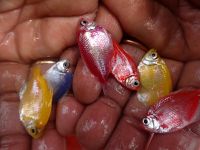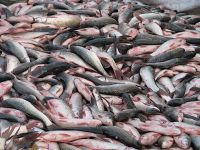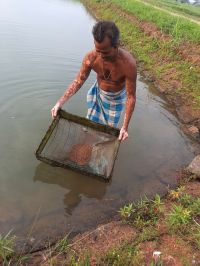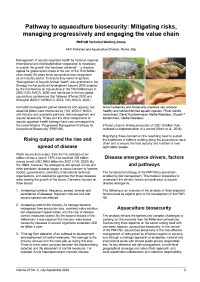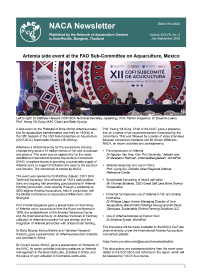Known as ‘glow widow tetra’, ‘glow skirt tetra’, ‘colour widow tetra’ in the ornamental fish industry, a genetically modified variety of the black widow tetra Gymnocorymbus ternetzi is the most favoured by aquarium fish hobbyists in West Bengal. Stunning and sparkling red, blue, yellow, green, pink, orange, and purple bodied colour variations of this tetra have been developed through gene transfer or transgenic technology. The fish glow when kept under blue LED lights, hence the name ‘glowfish’. Maintenance of these brightly coloured and reasonably priced fish in small and medium-sized aquariums at home, the office, hotels, and other settings has become popular in West Bengal, India.
This story looks back over the last century at the fisheries scenario in Moyna, a community development block in West Bengal, India. The tremendous success of aquaculture practice in Moyna has strongly influenced farmers of surrounding districts to convert agricultural lands to aquaculture. Capture fisheries in Moyna have had a rich heritage that has gradually evolved over time. Beginning with traditional deep-water paddy-cum-capture fishery, as practices evolved the fish component of the crop began to take on greater significance, becoming the most profitable part. Over time, farmers have shifted to an aquaculture model, achieving an average yield of 12.5 tonnes/ha/year.
Natural feeds present in ponds contribute to some extent to the nutrition of fish cultured therein. But these natural food stocks become insufficient as production intensity rises. In semi-intensive and intensive systems, nutritional inputs must be partly or wholly supplemented using external feeds to support higher growth and productivity. Good quality feed is essential to achieve higher production. The selection of proper feedstuff and good formulation to meet the requirements of the cultured species will enhance acceptance and utilisation. This article discusses feed preparation, ration size, feeding rate, feed distribution and feeding schedules for culture of Indian catfishes.
Management of aquatic organism health by national, regional, international and multistakeholder cooperation is necessary to sustain the growth that has been achieved. Progressive management pathways (PMP) are a convergence of risk management and biosecurity to form an adaptive approach to aquaculture biosecurity (AB) that is responsive and relevant to the resources and capacity that is on hand. The fundamental strategy of PMP/AB is prevention enabled by risk management, requiring an understanding of the drivers, factors and pathways to aquatic disease emergence. This article provides an overview of the role of progressive management pathways for aquaculture biosecurity, practices and progression, the benefits and a way forward.
In this issue:
Artemia side event at the FAO Sub-Committee on Aquaculture, Mexico; Great Salt Lake Brine Shrimp Fishery Meets MSC’s Fishery Standard; Reported Aquatic Animal Diseases in the Asia-Pacific Region during the Fourth Quarter of 2022; Report of the 21st Asia Regional Advisory Group on Aquatic Animal Health; Thai Fish Project; NACA participates in Coordinating Working Parties on Fisheries Statistics; NACA signs MOU with Cagayan Valley R&D Consortium; Shrimp Summit, 24-26 July, Ho Chi Minh City, Vietnam.
